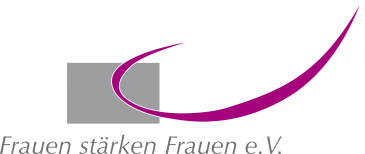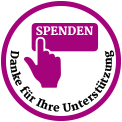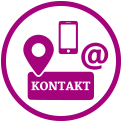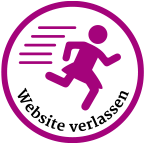Our history
is characterised by voluntary commitment, staying power, and by loud and soft words.
There's still plenty to do, and we want to achieve even more for the women and girls in Bergisch Gladbach and the Rheinisch-Bergisch district.
We're looking forward to everything that's to come, and we enjoy looking back proudly on all that we've achieved.
2024
bakers’ bags: Empowering girls and women
General Women’s Advice Centre for the Rheinisch-Bergisch district
We hold 755 counselling sessions with 430 women, 32 specialists and 24 confidant(e)s. There is an increase in the number of enquiries concerning social anxiety and loneliness, especially from younger women. We have bakers’ bags printed with the message “Auch du bist stark” (You are a strong person) to draw attention to the services we offer. We take part in the protest against the announced cuts in the social sector and support the implementation of the German Act on Protection against Violence (Gewalthilfegesetz).
Association
A major focus in 2024 is on the further development and analysis of content: the Board members and their colleagues attend a training course on Violent Behaviour by Women and Girls to expand their knowledge of a topic which, from the feminist point of view, has been given too little attention so far – without disregarding the fact that the vast majority of gender-specific acts of violence are carried out by men. The teams from both the Women’s and the Girls’ Advice Centres develop a protection concept designed in particular to protect clients from abuse of power.
Women’s refuge
62 women and 33 children find shelter in the women’s refuge. Two new kitchens are installed and the inside walls of the building are given a fresh coat of paint. With the arrival of a new colleague in July, the team now numbers seven for the first time. Thanks to financial support they are able to organise numerous leisure activities for the women and children.
Girls’ Advice Centre
444 girls and 40 confidant(e)s and multipliers contact the advice centre. We see an increase in the number of girls willing to attend a series of counselling sessions and come for advice over a prolonged period of time. The website is “refreshed” and made accessible to people with disabilities: for example, the main content is now available in simple language and sign language.
2023
Focus on accessibility
Marita Vonk is elected to the Board of the association. She replaces Elisabeth Rückl, who has given up her post after many years of service.
Thanks to financial support from the German charitable organisation “Aktion Mensch”, the website is now accessible for people with disabilities. All staff members attend an internal training course to further their expertise in Simple Language.
The Women’s Advice Centre for the Rheinisch-Bergisch district helps 9 % more clients and holds 14 % more consultations than in 2022. In the course of these consultations it becomes clear just how strongly dependent on their partners many women are, making separation difficult.
The number of clients with multiple problems – domestic violence, financial difficulties, housing shortage, concern for their children, mental stress caused by the various global crises – is as high as ever.
The Girls’ Advice Centre provides support in various contexts to 289 girls plus 102 multipliers and confidant(e)s. Topics frequently brought up at our prevention discussions include violence, assault and limits, especially within the peer group. Our offer of further training for multipliers on the subject of sexualised violence is taken up for the first time.
The Women’s Advice Centre and the Girls’ Advice Centre pool their public relations resources: in connection with the International day for the elimination of violence against women and girls they participate in the Orange the World 2023 campaign by switching on an orange light in the rooms for a few hours every evening for 10 days. The film “Embrace” is shown at the Cineplex in Bensberg to demonstrate that any form of insult or abuse based on appearance is wrong.
The Women’s Refuge says farewell to Kornelia Wagner-Kocabas, one of the founding members of the association and a member of the refuge staff, who has now retired.
42 women and 31 children find shelter in the refuge. The precarious housing situation means that many women are staying longer in the refuge.
To read the full annual report (in German) click here (PDF).
2022
End of AnBe
Association: The official name of the association is now Frauen stärken Frauen e.V. (Women empower women), as it is felt that this reflects more clearly than the previous name Frauen helfen Frauen (Women help women) the association’s central aim to recognise the strength of girls and women and to support them.
An internal training course on the subject of counselling in connection with gender diversity is held for all the sections of the association. A joint meeting is held with the men’s advice centre of the Sozialdienst Katholischer Männer e.V. in Cologne to exchange experiences.
The association takes a stand at the autumn fair in Wermelskirchen to inform the public about the work of its different sections with a view to doing the same in other towns in the Rheinisch-Bergisch district.
Women’s advice centre: Dagmar Schäfer joins the team of counsellors in April.
The number of face-to-face counselling sessions increases again following the pandemic, when the focus was on telephone counselling. Nevertheless, our telephone counselling service is still very much in demand, especially from women living in other towns in the Rheinisch-Bergisch district. As a result, there is less demand for our external counselling services.
The online counselling services for the girls’ and the women’s advice centres are combined, mainly for cost reasons.
Training sessions on the subject of domestic violence against women are held for lay language mediators, child and social welfare office employees, midwives and carers.
As part of the ASS project (anonymous forensics following sexual offences), a further training session is held for doctors at Vinzenz Pallotti Hospital in cooperation with the specialist counselling centre for sexualised violence.
In connection with International Day for the Elimination of Violence Against Women the advice centre helps to set up the exhibition “Was ich anhatte” (What I was wearing), a touring exhibition on the subject of sexualised violence organised by the Round Table No Violence Against Women.
Girls’ advice centre: In the middle of March, Louisa Nicolini takes over from Judith Wiedenhöft, who is leaving to undergo further training.
Public funding is extended by a further two years: the Public Health Office, the Child Welfare Office of the Rheinisch-Bergisch district and the Child Welfare Offices of the towns of Bergisch Gladbach, Wermelskirchen and Overath will continue to cover 80 % of the costs up to the end of 2023.
Due to the pandemic, most of the talks (on prevention) are held online.
The girls’ and women’s advice centres now share an online advice portal.
Women’s refuge: The women’s refuge celebrates its 30th anniversary.
AnBe: The contact and advice centre for girls and women travelling alone and for refugee women and their children closes its doors. We have been offering this low-threshold counselling service successfully since 2016, but the focus now needs to be more on integration and we lack the resources to do this. Refugee women and girls can continue to find protection and advice in the women’s refuge, the women’s advice centre for the Rheinisch-Bergisch district and the girls’ advice centre.
To read our complete annual report click here (PDF).
2021
Corona, year 2 / New name for the association
Association: The association members decide in November to change the name to Frauen stärken Frauen e.V. (Women empower women).
Women’s advice centre: There is a striking rise in the number of requests for counselling in connection with violence.
Activities: International Women’s Day (March 8, 2021): talk (organised by Finte) on the work of the advice centre during the pandemic; presentation of the centre’s counselling services in the café for mothers in the Kunterbunt family centre; participation in various events in connection with the ASS (anonymous forensics) project for doctors at Vinzenz Pallotti Hospital; contribution to International Day for the Elimination of Violence Against Women (November 25, 2021) in the form of a radio spot, information stands and the hoisting of Terre des Femmes flags.
The women’s and girls’ advice centres have a joint Instagram account.
Girls’ advice centre: Public funding for the girls’ advice centre is extended by a further two years. The Public Health Office, the Child Welfare Office of the Rheinisch-Bergisch district and the Child Welfare Offices of the towns of Bergisch Gladbach, Wermelskirchen and Overath will continue to cover 80 % of the costs from 2022 up to the end of 2023.
As of August 2021 there is an agreement with the town of Rösrath enabling us to offer our services to girls there, too.
Activities: Various information sessions and talks on prevention (mostly online); exhibition entitled “Klang meines Körpers” (Sound of my Body) (in cooperation with the Specialist Prevention Unit).
AnBe: Due to corona-related contact restrictions and the closure of local authority offices there is a sharp drop in the number of times we accompany women and girls to appointments and a corresponding increase in the demand for telephone counselling and the number of telephone calls with women.
Events: Information on contraception (October 5, 2021, in cooperation with donum vitae); information on corona vaccination (October 28, 2021, in cooperation with Agisra Köln); picnic with clients and their children (June 18, 2021).
2020
35th anniversary of the association / Corona causes significant disruption
Association: The association celebrates its 35th anniversary. The party planned for April to mark the occasion has to be cancelled because of the corona crisis. At the members’ meeting Anna Keppel is elected to the Board. Two employees are honoured for 25 and 15 years’ service respectively.
Women’s advice centre: In cooperation with the Specialist Unit for Sexualised Violence against Women we publish a flyer with information on the possibility of anonymous forensics following sexualised violence. Because of the corona pandemic we make increased use of the press and social media to inform the public about our services and availability.
Requests for counselling are 12 % up on the previous year.
Girls’ advice centre: The girls’ advice centre, which has been run as a project for nine years and financed by donations, is now to be partially financed by the town of Bergisch Gladbach and the Rheinisch-Bergisch communities of Wermelskirchen, Overath, Burscheid, Kürten and Odenthal. Requests for counselling remain on the same level as in the previous years. Due to the pandemic there are no prevention talks in schools, leaving more scope for networking and press work.
AnBe: The move to Paulusstr. 5A (in Bergisch Gladbach) on July 1, 2020 is celebrated in September with a small summer party held under corona hygiene conditions. There are three information events: in cooperation with the AOK medical insurance company on the subjects of bonus programmes and health accounts (in February with Elisa Ulrich); with Handan Çetinkaya-Roos (CR Communication connecting cultures) on the corona-related topics of regulations, punctuality, doctors’ appointments, school and everyday life (in February) and on the corona virus, hygiene, vaccinations, regulations (in March).
2019
Change at the head of the advice centre
Women’s advice centre: Birgit Lernbecher, a woman who has worked at the women’s advice centre since the very beginning retires and hands over the management of the centre to a colleague on March 1: Magdalene Holthausen.
AnBe: The contact and advice centre celebrates the completion of its third year; the project continues to be financed by donations. AnBe has a stand at World Children’s Day, and during the “Nahaufnahme” (Close-up) film festival, colleagues introduce the film “300 Worte Deutsch” (300 words of German) at the cinema.
2018
The association holds a closed meeting
Association: In November the association’s Board and the employees at the four different centres hold a closed meeting on the theme of “Life without violence for girls and women”. It becomes clear that the work of the association is becoming increasingly more complex. Developments in society and the consequences of this for their own work are discussed, the lack of resources confirmed. As from the end of the year the website is also available in English.
Women’s advice centre: Legal information evenings are now also held in Burscheid. April sees the first meeting of a self-help group for women with eating disorders at the women’s advice centre. Initially chaired by a counsellor, the group now meets independently.
Women’s refuge: The women’s refuge is given a Ford Fiesta, following their application to Aktion Mensch in 2017. The car is used jointly by the refuge and AnBe for removals, external appointments and accompanying women to appointments.
AnBe: At the beginning of 2018 AnBe, in cooperation with Agisra e.V. in Cologne and a gynaecologist, starts a series of talks on women’s rights in Germany, women’s health and contraception, female genital mutilation and arranged and forced marriages. AnBe organises both a summer and a Christmas party. AnBe again attends the “Nahaufnahme” (Close-up) film festival in Bergisch Gladbach with clients, as it proved so popular last year.
2017
The association presents itself in the "Rheinisch Bergischer Kalender"
September: An article about the women's advice centre appears in the yearbook "Rheinisch Bergischer Kalender 2017".
August: As part of the project GewinnGesundheit® Rhein-Berg the women's advice centre presents the exhibition "Warnsignale - Und das soll Liebe sein?" in Bergisch Gladbach district hall (24.-31.08.).
2016
The association turns 30 / A contact point for refugee women
Presentation of the exhibition "Warnsignale - und das soll Liebe sein?" (warning signals - and that's meant to be love?) to mark the 30th anniversary of the women's advice centre (in VR Bank Bergisch Gladbach and Kürten Rathaus). More to the 30th anniversary.
Participation in NRW state-funded project to support traumatised women refugees.
The women's advice centre stages a conference entitled "Alles nur psychisch!? Auswirkung von häuslicher Gewalt" (All in the mind!? Effects of domestic violence).
Frauen helfen Frauen e.V. celebrates its 30th anniversary with a stories café. The focus is on the association's "herstory", told by women from their different perspectives. Today the association comprises three organisations (women's refuge, women's advice centre, girls' advice centre) with a total of 11 staff.
2015
The new project ASS
The women's advice centre becomes part of the NRW state-funded project ASS (anonymous forensics) in hospitals for women who have suffered violence.
The women's refuge celebrates the completion of the reconstruction.
2014
The girls' advice centre goes online
The women's advice centre organises a conference entitled "Häusliche Gewalt gegen Frauen mit Zuwanderungsgeschichte: kulturelle Hintergründe und gesundheitliche Auswirkungen" (domestic violence against women with a history of migration: cultural backgrounds and health consequences).
The girls' advice centre receives funding from Deutsches Hilfswerk to set up an online girls' advice centre. Funding for the new project runs till 2017.
The women's refuge is extended to include a bathroom, a consulting room and a multi-purpose room on the ground floor. Funding is provided by Deutsches Hilfswerk and other donors. The women's refuge now has space for nine women and their children.
2012 - 2013
20 years women's refuge
2013: The women's advice centre starts working with the state-funded project "Gewinn Gesundheit" to improve health care for women women affected by violence.
The women's refuge turns 20.
2012: The girls' advice centre sets up the working group for girls and young women in Bergisch Gladbach and the Rheinisch-Bergischen district.
2010 - 2011
The girls' advice centre opens the door
2011: The association becomes part of Landesarbeitsgemeinschaft (LAG) Mädchenarbeit in NRW e. V. (NRW working group for work for girls).2010: The women's advice centre starts running external surgeries in Overath.
The association opens its third organisation, the girls' advice centre. The project receives funding for three years from "Aktion Mensch", "Software AG", the Bethe-Stiftung and donations.
The women's refuge is extended: Three rooms, a kitchen and two bathrooms for women and children are added. This expansion enables each woman to have her own room - fundamentally important to the recovery of the heavily burdened women and children.
2009
A NANA against violence
Plans are laid to add an extra storey to the women's refuge, using the proceeds from the sale of the house bequeathed to the association in 2004.
The rental agreement with the city of Bergisch Gladbach is converted to a leasehold agreement. This is a condition for receiving a subsidy from the Deutsches Hilfswerk.
"Für ein Leben ohne Gewalt gegen Frauen" (for a life without violence against women) is the title of this year's campaign by the women's advice centre. Several women create a life-sized "NANA" that is presented in different places in following years.
The women's advice centre starts running external surgeries in Kürten and Rösrath.
2008
The advice goes online
The women's refuge buys a nine-seater minibus with a grant from "Aktion Mensch". The minibus makes it easier for women to shop or move to a new flat. It can also be used for leisure activities for mothers and their children.
The women's advice centre adds online advice to its services, funded for two years by the DHW-Stiftung.
2007
Poster campaign
The flat bequeathed to the association in 2004 is sold. The proceeds are earmarked for the "purchase of living accommodation for women subject to violence and their children" (see 2009).
The women's advice centre launches a poster campaign in the district entitled: "Hinsehen - Hinhören - Handeln bei Gewalt gegen Frauen" (Look - Listen - Act on violence against women).
2006
20 Years advice centre
The women's advice centre is 20 years "young" and celebrates the anniversary with the travelling exhibition "Mein Beitrag - Eine Seite gegen Männergewalt" (My contribution - a page against male violence).
2004 - 2005
20 years of Frauen helfen Frauen e. V. / The association inherits a flat
2005: The 20 birthday is celebrated - there are celebrations in the pedestrian zone with music, coffee and cake... and a large public response. The association has two centres (women's advice centre and women's refuge) and employs ten full-time staff.
In keeping with new NRW guidelines, the women's advice centre takes on intervention counselling as covered by the Protection Against Violence Act.
2004: The association inherits a flat from a private individual with the condition that it be used for the "purchase of living accommodation for women subject to violence and their children".
2003
Move to the Hauptstraße 155
The women's refuge is reopened following the fire.
The women's advice centre expands with a move to Hauptstraße 155, Bergisch Gladbach.
2002
Application as an independent organization
Due to the increased demand for specialised advice services for girls, the association successfully applies for recognition as an independent youth welfare provider. The goal is to develop services for girls.
The women's refuge takes on intervention counselling as covered by the Protection Against Violence Act, carrying it out in the south of the Rheinisch-Bergisch district.
In July a fire destroys the second floor and roof framework of the women's refuge. The refuge remains closed for renovation until December.
2001 - 2000
Advice also for girls / A garden for children
In the women's advice centre the demand grows for specialised services for girls.
The garden of the women's refuge is redesigned for children, and playground equipment is installed. Donations and financial support from the city of Bergisch Gladbach make this possible.
1996 - 1999
New name and first computer
The women's centre is renamed women's advice centre.
Working conditions are improved for the staff of the women's refuge: the offices are equipped with new furniture and a new computer. This provides more capacity for supporting women affected by violence and their children.
Conversion work takes place to give the children who live with their mothers in the women's refuge a proper children's room to replace the previous provisional facilities. The work is funded by the city of Bergisch Gladbach and through donations. The children's area gets new furniture and play equipment.
The rooms and kitchen at the women's refuge get new furniture, and a first (second-hand) computer is organised for the office. Restructuring the rooms provides space for a consulting room where the women can speak with staff undisturbed.
1994 - 1995
The "Hexenkessel" becomes a "Frauenzentrum"
1995: The women's centre moves into new premises in Bergisch Gladbach's pedestrian precinct (Hauptstraße 182).
1994: The association and its centres get a new logo. The advice centre says goodbye to the "Hexenkessel" name.
1992
A year of major successes
The women's centre is recognised by the NRW federal state as a general women's advice centre and granted funding. Its chief topics are violence against women, separation and divorce, eating disorders and sexualised violence.
The women's refuge in Bergisch Gladbach is opened and included in NRW funding for women's shelters. Eight women and their children are taken in, though some women have to share a room.
Rooms, kitchen and office are fitted out with donated furniture, some of it second-hand. The staff of the women's refuge only have one room that has to serve as an office and a consulting room.
1990 - 1991
A safe flat is rented
1991: The first safe flat for abused women and their children is rented.
1990: The project "safe flat for abused women" starts.
Two part-time staff are employed through a job creation scheme (ABM).
1987 - 89
A safe space is needed / The association becomes part of LAG
The association becomes part of Landesarbeitsgemeinschaft (LAG) autonomer Frauenberatungsstellen in NRW (NRW working group for autonomous women's refuges).
Advice sessions increasingly show how urgent it is to establish a safe area for abused women.
The consultations run by the social education workers show a clear need for a safe space for abused women. A first attempt to set up a women's refuge in Bergisch Gladbach fails due to political opposition. Renewed efforts follow.
1986
The witch's cauldron boils in its own rooms
December: The association rents rooms of its own: the "Hexenkessel" women's centre opens in Gartenstraße 5 in Bensberg with two full-time staff. The graduate social education workers are employed through a job creation scheme (ABM) and offer individual consultations, talks, groups and a drop-in meeting point.
January: A weekly meeting session for women is set up in the DPWV youth café. Advice sessions are offered in the secondary school, made possible by volunteer women.
1985
Five women found the association "Frauen helfen Frauen"
Autumn: First advice, talks and discussion events offered by volunteer women as part of "Offene Tür" (open door) and DPWV.
May: Frauen helfen Frauen e. V. founded, based in Bergisch Gladbach and serving the Rheinisch-Bergisch district, under the umbrella of Deutscher Paritätischer Wohlfahrtsverband (DPWV). The aims of the association are to advise, support and encourage women.
Its goal is to establish a communication centre for women.



